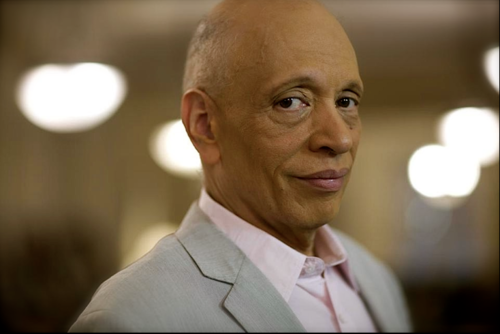Mark Anthony Neal's Blog, page 829
April 4, 2014
The Spin: All Women Media Panel -- Indiegogo Campaign Video
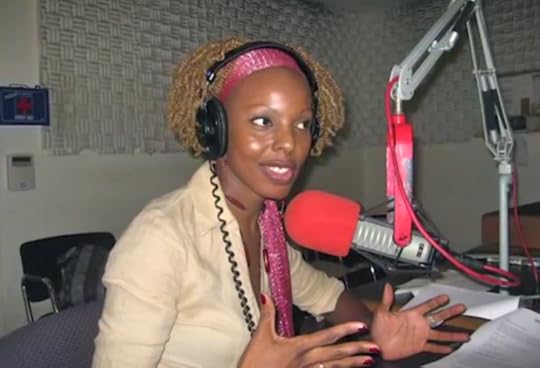 Esther Armah
Esther Armah
The Spin: all women media panel' is my brand new one hour weekly syndicated radio show. 60 minutes, once a week, 3 women commentators and me as host. The Spin's 'specialist contributors' come from the worlds of art, activism, journalism, academia. They bring their brilliance to issues of social justice, politics, culture, gender, race, love. Recorded at NPR, The Spin: all women media panel. Smart=sexy. THE SPIN:#40for40 . Seeking to raise $40,000 in 40 days to cover 6 months production costs.
Published on April 04, 2014 15:49
Hip Hop Academy: Inside A Beatmaker's Harvard Class
Published on April 04, 2014 15:06
Left of Black S4:E26: Sex Trafficking in Brazil
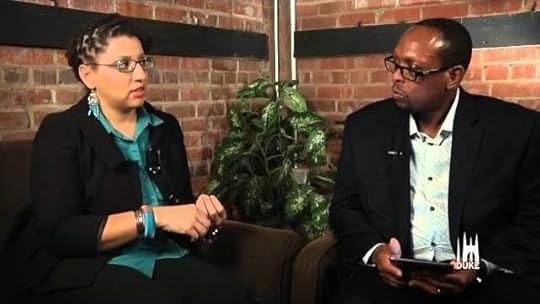 Left of Black S4:E26: Sex Trafficking in Brazil
Left of Black S4:E26: Sex Trafficking in Brazil
Left of Black host and Duke University Professor Mark Anthony Neal is joined in studio by Erica Lorraine Williams, assistant professor in the department of sociology and anthropology at Spelman College. Professor Williams is the author of Sex Tourism in Bahia: Ambiguous Entanglements (University of Illinois Press).Left of Black is a weekly Webcast hosted by Mark Anthony Neal and produced in collaboration with the John Hope Franklin Center at Duke University.
***
Episodes of Left of Black are also available for free download in @ iTunes U
***
Follow Left of Black on Twitter: @LeftofBlackFollow Mark Anthony Neal on Twitter: @NewBlackMan
Follow Erica Lorraine Williams on Twitter: EricaLWilliams7
Published on April 04, 2014 14:44
Cancer Disparity Among Black Women Unresolved
Published on April 04, 2014 12:58
April 3, 2014
Colbert Logic by David J. Leonard
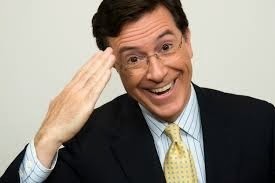 Colbert Logic
by David J. Leonard | NewBlackMan (in Exile)
Colbert Logic
by David J. Leonard | NewBlackMan (in Exile)Much has been written about The Colbert Report, the #cancelcolbert hashtag, and to a lesser degree, the issues of racism (and sexism) within contemporary culture. Not surprisingly, many of Colbert’s defenders, whose use of social media to defend, deny, dismiss, and demonize has not raised questions about the efficacy of social media, have scoffed at criticism, offering three words: “But it’s satire.”
While The Colbert Report may indeed be satire, that’s really neither a defense nor a source of clarity. The discussion and critical engagement with this particular sketch (and the decontextualized tweet) should not be a referendum on whether “it’s satire or not” whereupon checking the satire box leads one directly to Go, skipping “is it racial/racist” square. Instead, we must ask, was it good satire? This is not about intent, but rather about its effectiveness as satire?
According to Lisa Guerrero, satire is “a form of literature, performance, or visual art that ridicules human folly as a means of social criticism in an effort to foment change and/or to serve as an admonition.” In this context, we can see how the recent sketch fits: Colbert sought to highlight the injustice and acceptance of racism evidenced by the nation’s #1 sport – national pastime 2.0 – having a team within the nation’s capital named for a violent and white supremacist racial slur. To illustrate this “folly,” to ridicule the normalization of this slur, and to mock owner Dan Snyder’s creation of Despite its racist name, its inclusion of a disparaging slur, the absurdity and hypocrisy of starting an organization seeped in anti-Asian stereotypes, it too would “provide meaningful and measurable resources that provide genuine opportunities.” By Dr. Guerrero’s definition, Colbert sought to highlight the injustices associated with Snyder and his franchise by creating a legible parallel. That is, by highlighting the absurdity and unacceptability of his imaginary organization, we would see all that is wrong with Snyder. Change…admonition . . .drop the mic.
The problem is that both anti-Asian and anti-Native racism are commonplace within contemporary America. Just as a team is named after a racial slur, or another can contain a dehumanizing racist mascot (looking at you Cleveland) in the name of “tradition,” honor, or maybe humor, Asian Americans are routinely mocked, disparaged, and stereotyped. Colbert, thus, didn’t highlight folly or hypocrisy. That would require the legibility of injustice in imagining Asian Americans as foreigners with heavy accents that convey incivility and a lack education.
The acceptance of and pleasure resulting from anti-Asian racism within popular culture (Cue clips from Two Broke Girls, Dads, Family Guy, How I met your mother, Gilmore Girls, All American Girl, any number of video games, standup routines from Seth Macfarlane, Chelsea Handler, Sarah Silverman…..) along with the persistence of anti-black, anti-Native, anti-Arab and anti-Latino representations reveals the problems with the “satire card.”
This logic presumes a racial justice ethos or an opposition to racism that lacks factual basis. It is akin to those who like to invoke rhetoric that claims that such would not be accepted if this _____ (popular culture, public commentary, political statements) had focused on African Americans, seemingly ignoring the rampant anti-blackness that is commonplace within every American institution.
Given the history of the United States (see here for discussion), whereupon racist images and auditory signifiers have been used to rationalize state violence, and given how microaggressions are a daily reality for Asian Americans, it’s hard to read Colbert’s skit as successful satire. Its success hinges upon (white) viewers sitting down with their PIGSKIN snuggie in tow, only to become outraged at this team’s name BECAUSE the thought of an-Asian slur, or an Asian mascot was so offensive and outrageous.
In reality, anti-indigenous racism, and anti-Asian jokes are commonplace and acceptable; just as anti-Latino and anti-black racism are entrenched realities in “post-racial America” – televisions sets, virtual reality, the Internet, films, and a myriad of cultural productions are littered with toxic racism.And to the question of change: do we really think this segment was designed to foster change; even Colbert himself has failed to use the sketch to advance a conversation about mascots or the nation’s foremost racist mascot. As noted by the always brilliant Arturo Garcia,
Colbert was also as guilty of erasing the Native community’s stake in the affair as anybody else; he referenced the Keep America Beautiful “crying Indian” commercialand wore the colors of Snyder’s NFL team without any comment from Wong; he did not discuss the #Not4Sale, #NotYourMascot, or #NotYourTigerLilycampaigns; and he did not, as activist @jaythenerdkid suggested over the weekend, invite a Native American comedian on the show for their take on the matter.
He has good company. While there have been countless articles condemning the hashtag and mocking the activists who have pushed for accountability, few of these authors have ever written anything condemning Snyder, the D.C. team’s name, or a culture of mascots. “We have been told that Colbert’s joke was aimed at the abhorrent racism of the name of the Washington football team, and that bringing up the question of racism aimed at Asian Americans is a distraction that will hurt the cause of Native Americans,” writes Julia Carrie Wong.”
This is a charge that would be easier to swallow were it not for the fact that so many of the writers putting forth this argument have never written about changing the name of the team themselves. Park and many of her fellow #CancelColbert tweeters have a history of engaging in Twitter activism against the team’s name alongside Native American activists: See #NotYourMascot as one example.”
The defenders of Colbert—racial justice freedom fighters—have been silent on the ample racism and sexism directed at Park and countless others. This is of little surprise given the lack of concern for ample examples of racism within and beyond popular culture. Considering their support for Colbert and satire emanates from the value they place on justice and social transformation, it is ironic that these same voices have remained silent in the face of so much violence. And by ironic, I mean shameful and telling.
In the end, the faulty logic of the sketch, its reliance on “colorblindness,” its belief in the post-raciality of most (Comedy Central) viewers, and its focus on pleasure over change, all point to how this sketch fails as satire. The flurry of racism and sexism, rather than demands for accountability and change from within the Internet and football stadiums, elucidates the limitations of satire. The illegibility of the violence and trauma of both Native American mascots and linguistic mocking directed at Asian Americans reminds us once again that organizing and “ceaseless” agitation, not satire, will foster change.
***
David J. Leonard is Associate Professor in the Department of Critical Culture, Gender and Race Studies at Washington State University, Pullman. Leonard’s latest books include After Artest: Race and the Assault on Blackness (SUNY Press) and African Americans on Television: Race-ing for Ratings (Praeger Press) co-edited with Lisa Guerrero. He is currently working on a book Presumed Innocence: White Mass Shooters in the Era of Trayvon about gun violence in America.
Published on April 03, 2014 13:47
April 2, 2014
Erykah Badu: Behind the Cover
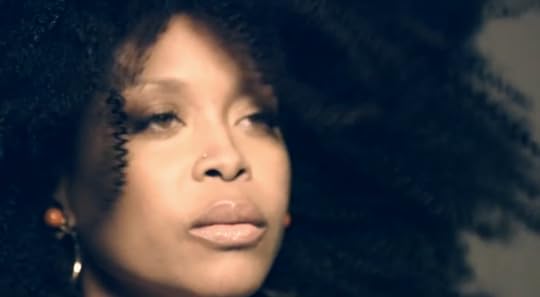 Essence
Essence
The queen of cool looks, Erykah Badu, talks about beauty, self expression, and what it means to be an independent person within motherhood.
Published on April 02, 2014 04:13
Dance Music Legend Frankie Knuckles Dies At 59
Published on April 02, 2014 03:53
March 30, 2014
Cornmeal Waffles With Bourbon Syrup | Melissa Clark Recipes
 New York Times Video
New York Times Video
It's time to pull the waffle iron out of storage. Melissa Clark shows how to make light and fluffy cornmeal waffles with a healthy drizzling of banana bourbon syrup.
Published on March 30, 2014 13:08
March 28, 2014
Behind the Checkpoint: Jasiri X in Palestine (part one)
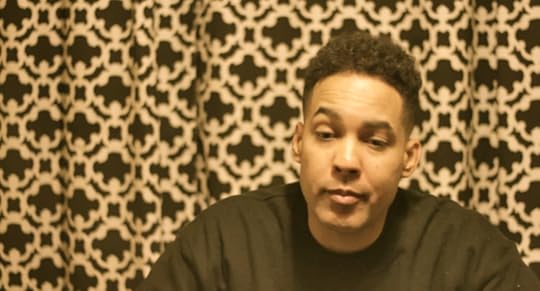 1Hood Media Presents
1Hood Media Presents
In "Behind the Checkpoint, Part I" Jasiri X shares his experience of traveling to the Palestine and Israel with a delegation commissioned by the Carter Center. Behind the Checkpoint explores issues of the region and the people who live there.
Published on March 28, 2014 15:42
Walter Mosley: To End Race, We Have To Recognize 'White' Doesn't Exist
Published on March 28, 2014 12:14
Mark Anthony Neal's Blog
- Mark Anthony Neal's profile
- 30 followers
Mark Anthony Neal isn't a Goodreads Author
(yet),
but they
do have a blog,
so here are some recent posts imported from
their feed.





